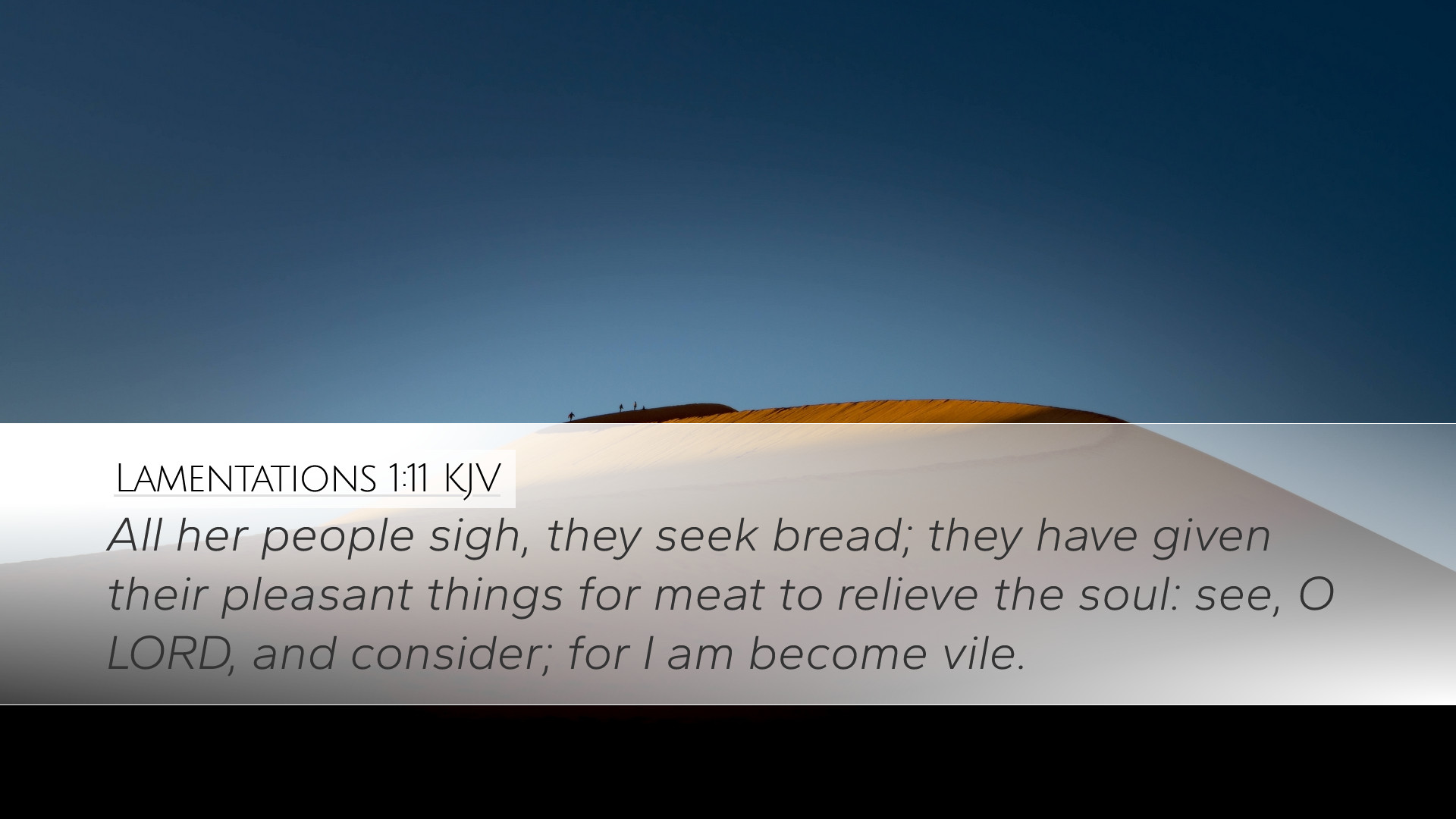Lamentations 1:11 Commentary
"All her people sigh, they seek bread; they have given their pleasant things for meat to relieve the soul: see, O LORD, and consider; for I am become vile."
Context and Overview
This verse comes from the book of Lamentations, traditionally attributed to the prophet Jeremiah. It reflects deep sorrow and mourning over the destruction of Jerusalem following the Babylonian siege. Lamentations articulates themes of suffering, loss, and the desperate condition of the people of Israel. In this particular verse, the focus is on the desperate plight of the people, indicative of their brokenness and the extent of their suffering.
Insights from Matthew Henry
Matthew Henry elucidates the profound anguish embedded in this verse, emphasizing the communal suffering of the people. He notes that "all her people sigh," indicating a collective lamentation rather than individual distress. The people’s cries stem from their dire need for sustenance, symbolizing a more significant spiritual and physical poverty.
- Spiritual Hunger: The term "bread" is not solely about physical sustenance but emblematic of the spiritual nourishment that they lack, highlighting their need for God’s provision.
- Desperation: The phrase "they have given their pleasant things for meat" suggests that the people have resorted to desperate measures, exchanging things of value for basic life-sustaining food.
- Calling to God: The lament in "see, O LORD, and consider" reflects a plea to God for understanding and intervention in their plight, revealing their awareness of His sovereignty amidst suffering.
Insights from Albert Barnes
Albert Barnes provides a poignant interpretation of the emotional and physical exhaustion experienced by the people. He notes that the word "sigh" denotes a deep and palpable grief, which reveals the intensity of the people's suffering.
- Loss of Community: Barnes suggests that the communal nature of suffering in this verse highlights how the devastation has fractured their social bonds, underpinning the isolation within their suffering.
- Exchange of Value: The reference to "giving their pleasant things for meat" signifies a forfeiture of dignity and identity. The people are bartering their joy and beauty for mere survival.
- Theological Implications: Barnes notes that this verse exemplifies the depth of human desperation apart from God, serving as a powerful reminder of the necessity for divine support and spiritual nourishment.
Insights from Adam Clarke
Adam Clarke offers a detailed exegesis focusing on the sociocultural implications of the suffering depicted. He emphasizes that the public disgrace faced by the people showcases the catastrophic impact of their sins and the holy justice of God.
- Vile Condition: The phrase “I am become vile” suggests a transformation in the self-perception of the people. Clarke elucidates that they realize their unworthiness and desolation before God due to their actions.
- Public Appeals: Clarke points out that their appeal to "see, O LORD" is not just a personal plea but a collective petition for recognition and divine intervention in their dire situation.
- Hope amidst Despair: While there is a sense of hopelessness, Clarke argues that acknowledging their plight before God is the first step towards restoration and healing.
Theological Themes
This verse encapsulates several vital theological themes, particularly regarding the nature of human suffering and God’s redemptive plan.
- The Reality of Sin: The suffering depicted in Lamentations serves as a reminder of the consequences of sin. The loss and desperation experienced by the people are rooted in their turning away from God.
- God’s Justice: The destruction of Jerusalem is not merely a historical event but a manifestation of divine justice. This underscores the Biblical principle that while God is merciful, He is also just.
- Longing for Restoration: The cry for God’s attention suggests a yearning for restoration, not just in terms of physical sustenance but spiritual healing as well.
Application for Today
For pastors, students, and theologians, Lamentations 1:11 offers profound insights into the human condition and the necessity for reliance on God. The following applications can be drawn:
- Crisis of Identity: Just as the people of Jerusalem became aware of their vile condition, modern believers must confront their true spiritual state and the times they have strayed from God’s provision.
- Empathy in Ministry: This verse urges ministers to cultivate empathy towards those suffering in their communities, understanding that their needs extend beyond the physical.
- Seeking God in Despair: Believers today can take heart that even in their darkest moments, bringing their burdens before God and seeking His help is both a biblical and necessary response.
Conclusion
Lamentations 1:11 serves as a poignant reminder of the depths of despair that can occur when a community turns away from God. The insights from Matthews Henry, Albert Barnes, and Adam Clarke provide a rich tapestry of understanding regarding the nature of suffering, the importance of community, and the theological implications of this lament.
Pastors, students, and scholars alike are called to reflect on the themes of this scripture and apply its lessons to their lives and ministries, fostering a deeper understanding of God’s grace amid human suffering.


